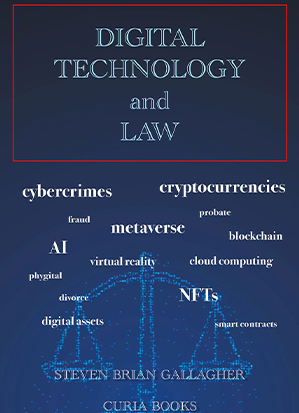Lawyers who are slow to embrace the digital future are likely to be swallowed by it, warns Hong Kong law professor Steven Gallagher.
“In the artificial intelligence world, the law is having to develop very quickly to keep up with the ownership of intellectual property created by AI, and the possible infringement of the intellectual property rights of these whose work has been used to train AI and generate AI output,” Gallagher told Asia Business Law Journal.
But that is just the tip of the spear, and at the present time. The digital future is very broad, indeed.
Gallagher, a professor of practice in law at The Chinese University of Hong Kong, has penned a new book for lawyers and others in the legal community to address the topic. He says people involved in the digital world must have a basic understanding of the law as it affects them ‒ the rights they have, the issues that may arise, and their possible civil and criminal liabilities.

“I really became interested in digital technology and law back in 2017,” he says. “It was the early days of crypto and artificial intelligence but already there were legal issues arising.
“I also teach a course on art law, and the impact of digital technology and the art world was already raising some interesting questions about intellectual property, fakes and authentication, marketing and the future of business in the art world.
“With the sale of Beeple’s digital artwork, Everydays, in 2021 for USD69 million, as an NFT (non-fungible token), my students were even more interested. I had to find out about this digital technology. That meant trying to understand the technology and considering the legal implications of the technology, of using it, and what would happen if things went wrong.”
Gallagher says lawyers today cannot expect to exist without understanding at least the basics of digital technology. “Even old lawyers, like me, have to understand how digital technology works, how it is used in legal practice and how our clients are affected by digital technology in their lives, their loves, their businesses and even their deaths,” he says.
In the legal world, digital technology is already very important: “We use digital technology to practice law and digital technology is affecting every area of the practice of law,” he says.
Pressing legal issues
Artificial intelligence presently tops Gallagher’s list of opportunities and risks. Obviously. “Some jurisdictions are drafting special laws to deal with these issues; others are trying to use their existing laws,” says Gallagher. “We will see more disputes about these issues as the AI is improved and more commonly used.”
But Gallagher’s issues list is extensive. Is crypto property, for instance? “This may seem merely an academic matter to the non-lawyer, but it really matters if someone steals your bitcoin and you want to get it back, or if your [partner hides their] collection of Bored Ape NFTs just before you petition for divorce,” he says.
“Other issues that may arise for those dabbling in the digital world include possible tax consequences, how these assets would be dealt with on the death of the owner, and whether you may innocently have purchased an asset that should be subject to securities regulation but isn’t.”
Then there’s cybercrime of all types – fraud involving crypto in simple Ponzi or rug-pull scams.
“Cybercrime leads us into an issue that encompasses all areas of the digital world – AI, crypto, Web3.0 and the metaverse – the issue of privacy,” says Gallagher.
“We share so much information today, our lives are lived at least partly in the digital world. Our devices, watches, cars, and even our refrigerators are ‘smart’. This has consequences. Our smart devices communicate sending information to the internet of things to be stored in the cloud, and anything transmitted and stored may be intercepted and stolen.”
Gallagher’s personal dive into digital technology has led him to publish a book of ideas for lawyers, titled Digital Technology and Law. He says it is a guide to technology and the law that he hopes will bridge the gap between academic writing and popular understanding.
It “explores the interaction between technology and law, delving into various aspects of electronic digital technology such as AI, digital property, blockchains, cryptocurrencies, NFTs, smart contracts, decentralised autonomous organisations (DAOs) and the metaverse,” he says.
“It further explains their functionality and limitations, as well as their impact on the legal field.”
Recommended actions
Gallagher’s advice might be summed up as doing the first things first.
“Start becoming familiar with digital technology because it has already had a far-reaching impact on the practice of law, and is only going to further impact on the practice of law,” he says.
“Lawyers will encounter digital technology in all areas of the law. If you are a corporate lawyer, your clients may get involved in digital technology as a business or as an investment, or set up a parallel DAO to carry out a project.
“If you are a commercial lawyer, your clients may record their transactions on blockchains and expect you to advise them on the importance of this, and the risks.
“If your client uses AI to invent a new product, they will need advice on whether it can be patented.”
But if you’re too slow, Gallagher offers this warning: “If you are not familiar with digital technology, your clients may seek advice from a robot lawyer.”
Steven Gallagher is a professional consultant, professor of practice in law and associate dean of academic and student affairs at CUHK Law. His research interests include property law, legal history, law and technology and how Chinese custom is incorporated into Hong Kong law. He has particular expertise in cultural heritage, art and antiquities laws. His new book is abailable at www.hkcpdcourses.com/publications.




























